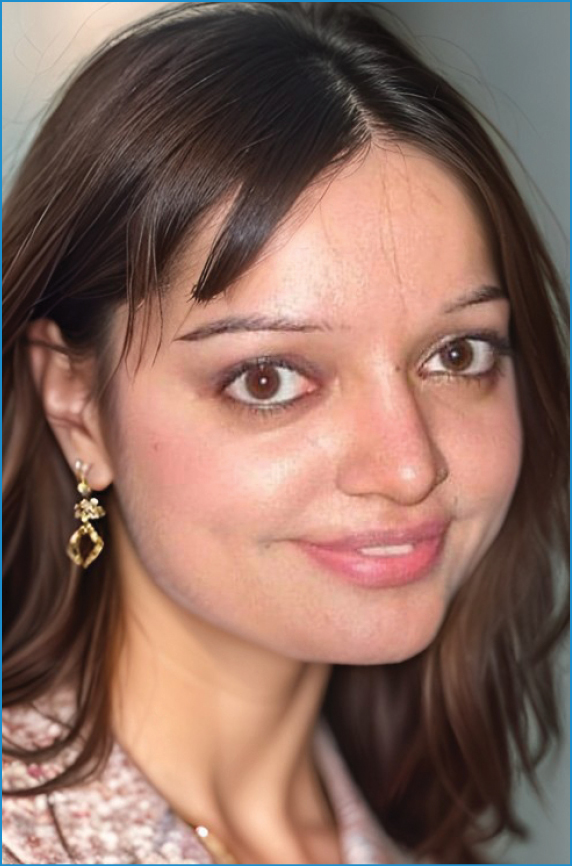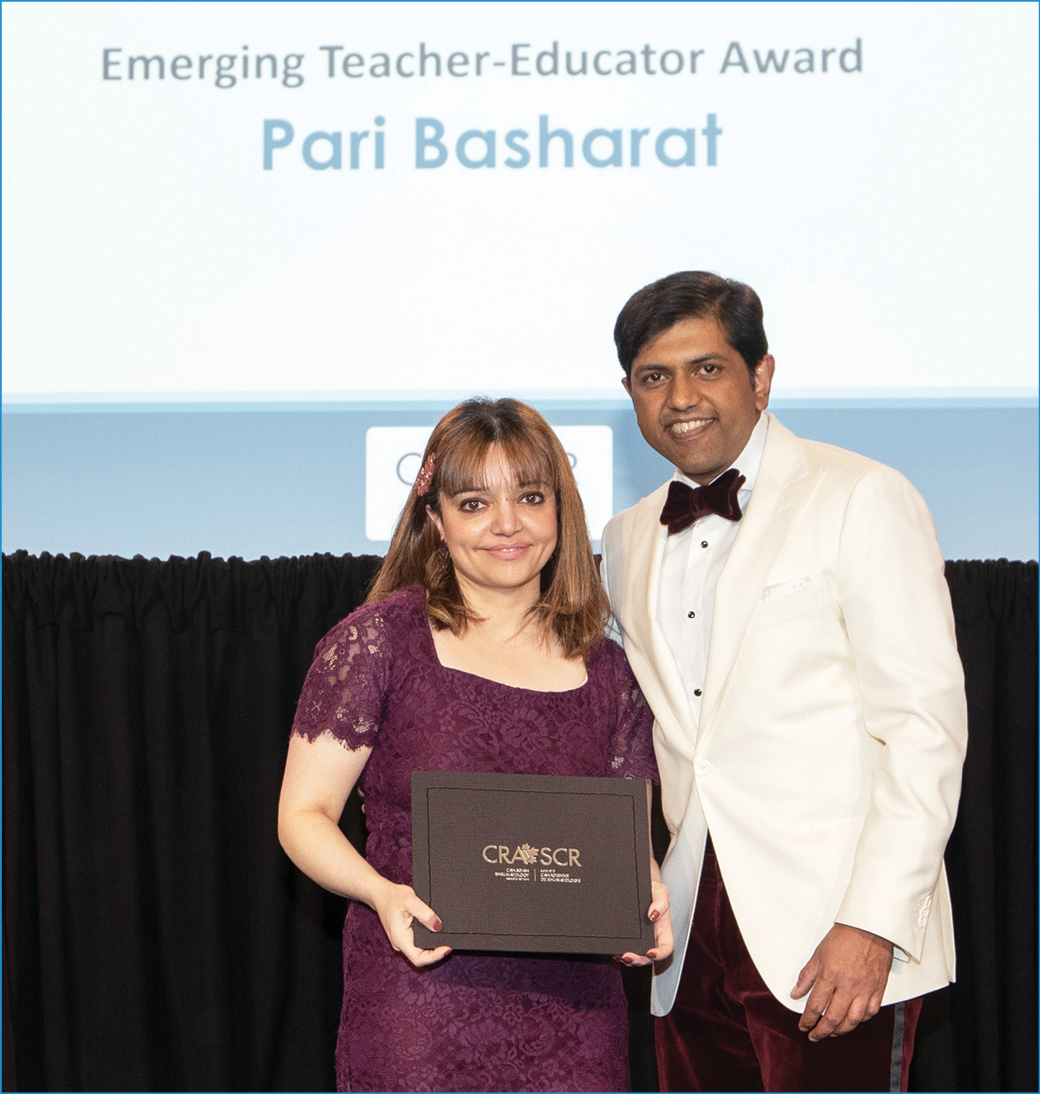Summer 2024 (Volume 34, Number 2)
The CRA’s 2024 Emerging
Teacher-Educator: Dr. Pari Basharat
Download PDF

What or who inspired you to become involved in medical education?
I was definitely inspired by my teachers and mentors along the way. Teachers have always played a very important role in my life. Even as far back as elementary school, I still remember educators who went out of their way to nurture the spark they saw in their students. In medical school, I was most inspired by staff who seemed to genuinely enjoy the work that they did, and who sincerely shared their knowledge with enthusiasm and creativity. Part of what has always attracted me to medicine is the many roles we fulfill, teacher and educator being one of them. It has always been the path of medicine that I wanted to explore, as I think one of our most important roles is passing on knowledge and inspiring those who follow us, who will become the future leaders and educators of tomorrow. And we learn so much from our students along the way, too. We are, in fact, lifelong students ourselves! In medicine, there is always something new to learn.
Can you recall a teacher in your own past who inspired your direction into education?
My first teachers in life, for all things, and on so many levels, were my parents. They are definitely a constant source of inspiration. I have learned from their intellectual curiosity, work ethic and patience. My dad loves problem solving and helping out others. My mom has an outstanding way of connecting on an intellectual and emotional way with people, during her time working and in leadership positions, but also just in life in general!
In elementary school, I had a wonderful educator who took the time to get to really know each student and help them hone and further their knowledge and skills and celebrate their uniqueness. I remember her taking the time to support us in student government, and her spending time with me practicing public speaking for example. Later on in life, I was privileged to be part of her medical team as a physician caring for her during a time of illness. It was truly a full-circle moment!
What do you believe are the qualities of a good educator? Moreover, how do these apply to you?
A good educator really needs to be empathetic and in tune with their learners. As doctors, I believe most of us are inherently empathetic — it is what drew us to this profession. Being empathetic with a learner means really spending the time to see where they are coming from. What are their goals? Challenges? How does one as an educator uniquely connect to and inspire their student? This means being creative and innovative as well.
You have a special interest in inflammatory myopathies and have completed a fellowship in Inflammatory Myopathies at Johns Hopkins University. You currently conduct subspecialty clinics in this area that are one of the highlights of the rheumatology resident program at Western. You also participate in research in this area, have mentored residents in research projects in myopathies, and lecture on this topic at residency courses and conferences. Can you tell us more about your research and findings?
The exciting thing about myositis is that there is so much more to learn about this group of diseases. There are many opportunities for collaborative research in this field. I am lucky to be connected with international myositis research groups. But working with interested residents is great, too. At the local level, I worked with residents on looking at interstitial lung disease patterns and treatments based on myositis antibody profiles, for instance. I recently became a part of the Myositis International Health and Research Collaborative Alliance and I look forward to working with this organization in the future.
What was your first thought when you learned that you would receive this award?
I was very honoured to learn I received this award. I have learned so much from my teachers and educators along my educational and professional journey, so to be given this award really meant a lot to me!

Dr. Pari Basharat receiving her award from outgoing CRA President Dr. Nigil Haroon at the CRA Annual Scientific Meeting in Winnipeg, which took place in February 2024.
You are currently Curriculum Coordinator for the Internal Medicine (IM) Program at the Department of Medicine at Schulich. Moreover, you are a member of the IM Residency Training Committee (RTC), a member of the Post Graduate Medical Education (PGME) Committee at Schulich as well as a member of the PGME Policy Subcommittee. As a respected teacher-educator, what would your advice be to
a prospective rheumatologist?
My advice would be to choose something that really excites and motivates you, and if you already have an interest in rheumatology, that’s a great sign because it means you have discovered this specialty that is full of fascinating pathology and developments. Many people don’t realize how stimulating a specialty rheumatology is until they are exposed to it; it is a black box for many, so you are already at an advantage! I would say always approach your clinics with a sense of curiosity and creativity. Learn from those around you, especially in the first few years of your practice. Expose yourself to collaborations with others in the field, and with clinicians in other specialties. You never know where inspiration will come from and what future projects could lie ahead. Never stop asking questions and learning, and I would highly recommend being involved in education. It is an area that will keep you constantly inspired, it is highly fulfilling and you will learn a lot from your learners.
Do you have any advice for those who mentor trainees in rheumatology?
I would say mentoring is a great way to keep the passion alive for our specialty. Sometimes we become jaded with the everyday grind, and many times we forget how far we have come and even the great innovative things we have done in our profession. Mentoring is a way to remind ourselves what drew us to this specialty in the first place. It keeps our sense of wonder and curiosity alive, since we are exposed to and inspired by those we are mentoring. It is a constant positive reminder of why we chose this path in life.
What are some of your other passions outside of rheumatology and medical education?
I am an avid creative writer, and really enjoy writing poetry and prose. Some of my poems have been published in medical journals and recently in an anthology book about the history of the stethoscope. It is a great way to unwind and be reflective. I also enjoy gardening, spending time in nature, and interior decorating.
You are marooned on a desert island? What book would you like to have on hand with you?
“Pride and Prejudice” by Jane Austen. It never gets old and is very layered and provides a very interesting social commentary.
What is your favourite food or cuisine?
I love Persian food. It is a great example of a varied cuisine that is not spicy or overwhelming, but bursting with flavour and with many options for everyone to choose from and to enjoy.
You are handed a plane ticket to anywhere in the world. Where do you go?
I would go to Istanbul. It is a city filled with history, culture, and beautiful arts and cuisine. The people there are lovely too.
How many cups of coffee does it take to make a productive day?
I actually do not drink coffee! I have never cared for the taste of it, and it makes me feel too jittery. I prefer a soothing hot mug of decaffeinated tea. I know I am definitely an anomaly when it comes to physicians in this respect!
Pari Basharat, MD, FRCPC
Program Director, Adult Rheumatology
Department of Medicine,
Division of Rheumatology
University of Western Ontario,
Schulich School of Medicine and Dentistry
London, Ontario
|
